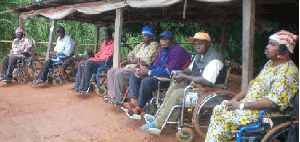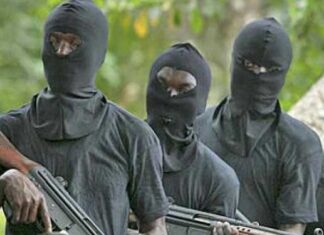Special Correspondent, CHIBUZOR NWACHUKWU, who visited Oji town, settlement of wounded ex-Biafran soldiers, paints a picture of neglect of the veterans by federal and South East states government.
Cross section of Biafran war veterans
To some Nigerians, the events and pains of the 30-month (1967-1970) civil war may have come to an end. This is, however, not the case with the ancient town of Oji, in Oji River Local Government Area, Enugu State, where the existence of a complex that houses the wounded Biafran soldiers remains a sad reminder of the tragedy that began on July 6, 1967 and saw the loss of lives and displacement of many, especially of the then Eastern Region.
These ex-soldiers, who were brought to the complex with various degrees of injuries in 1975, still live in utter frustration on account of abandonment they have gone through in last 39 years by both the federal and South East state governments.
Resignation to fate
Entrance where they received Ojukwu
Ironically, the war veterans seem to be living on an island, as they do not have neighbours that can alleviate their plight. They have, thus, resigned to fate, as they live almost next door to yet another set of helpless inmates of the leprosarium in the same town. They visit the same Oji General Hospital, in sharp contrast to claims by top government functionaries at the state and federal levels that the ex-soldiers’ quarters have been equipped with the best of medical facilities.
Gilded sepulchre
The veterans’ settlement, according to TheNiche investigation, has been overgrown by weeds, with heaps of refuse taking over the better part of the landscape.
A cursory look at the two bungalows in the settlement can sell a dummy to a first time visitor to the complex that all is well. But a careful look into the makeshift partitioned rooms reveals a story of neglect.
The gangway can pass for a facility for awaiting trial inmates of the Nigerian prisons – what with the stench from the wet rooms throwing off the visitor.
Our reporter gathered from the inmates that, since 1975, over 28 veterans have died out of poor medical attention, hunger and abject neglect by federal and South East states governments.
Electioneering tool
Room of one of the late soldiers
TheNiche gathered from the ex-combatants that politicians only visit the settlement during campaigns, to sell the impression of feeling their pains, but hardly return after being voted into office.
Even the late Biafran Head of State, Chukwuemeka Odumegwu Ojukwu, was said to have only stopped over by the road side to acknowledge salute from his wounded officers and men when he returned from Cote d’Ivoire in the run-up to the 1983 general elections.
It was, however, learnt that the only source of succour for the veterans is from the leader of Movement for the Actualisation of the Sovereign State of Biafra (MASSOB), Ralph Uwazuruike.
Uwazuruike, it was learnt, had built and completed a Biafran War Veteran’s Village at Okigwe where some of the ex-soldiers were relocated and resettled. Not all the soldiers could, however, be evacuated due to the level of their injury and disposition of their respective families.
Personal ordeal
One of those not relocated, Pa Felix Okereke, from Ekwulumili town in Nnewi South Local Government Area of Anambra State, was found on his wet bed nursing his spinal cord injury.
“I was a Private in the Biafran Army under 29 Battalion X Company. We went for Second Division attack at Onitsha in 1969. That was where I sustained my injury. We went on attack where the federal troops were staying in Onitsha. Unfortunately, I had bullet wound at my waist. The soldier that did it shot me from behind and I fell into the trench and could not come out. While I was shouting for help, they fired a mortar which fell inside the trench and affected my right hand.
“Then, one of the commanders of the federal troop asked his boy to find out who was crying, and he said it was a Biafran soldier. He ordered him to go and collect my gun and all the bullets that I had. I even wanted to bribe him with the money I had, so that he could help me out of the trench. But the soldier came there and collected my gun and bullet and left me there. It was later in the evening that our men came and brought me out in a pool of blood,” he lamented.
He recalled that later the wounded soldiers were taken to Ihite-Owerri because the federal troops had already taken over the entire place.
“After a month or two, a reverend father told us that the Nigerian soldiers had come and we had to hide our uniforms and disguised as civilians. The commander ordered that those that could enter vehicles should follow them, so that they could attend to them. But some that could not follow them were left behind due to our conditions,” he added.
His wife later found him and he was taken to his Ekwulumili hometown along with his seven children. His first son later died.
The soldiers were later taken to GTI Hospital, Enugu, for treatment, after spending time at the then Park Lane Specialist Hospital, now known as the University of Nigeria Teaching Hospital (UNTH), Enugu.
Okeke recalled that it was thereafter that they were brought to Oji Settlement in 1975 for rehabilitation.
“We were advised to remain here in our own interest or we would be shot. That was how we stayed back in Oji Settlement. I could not go back to Ekwulumili because I would die there. Again, when we stay together, our problems are relieved because much concern about our condition would be reduced,” he said.
Good Biafran
Okereke and his colleagues, however, expressed happiness at the magnanimity of Ajuluchukwu Uzodike, Chief Executive Officer of Cutix Cable, Nnewi, who is an ex-Biafran officer.
Uzodike, it was gathered, has made it a point of duty to visit the veterans in Oji and Okigwe with gift items, medicaments and money for their up-keep.
“God will continue to bless that man, Ajuluchukwu Uzodike. That man has always been with us. Every time, he is here to help us. We always pray that God will continue to give him what he will use to help the less-privileged people like us. That man is Godsend and we shall forever remain grateful to him and his family,” Okereke said.
Entitlements denied
Worsening their woes is the fact that the celebrated payment of pension and gratuity to ex-Biafran and Nigerian soldiers did not get to them. They lamented that all their Hausa and Yoruba counterparts have been paid, leaving the Biafran soldiers of South East extraction, even when their names and numbers are in the federal government’s list.
For 22-year-old Chidubem Ifeacho, the settlement is the only home that he knows, given that he was born into the complex. Though he is from Abatete in Idemili North, Anambra State, it was when he lost his father last year that he got to know his hometown.
Ifeacho lamented that his father’s relations refused to help them, adding that they do not have any place to stay, hence he and his siblings had to return to Oji where they are sure of a roof over their heads.
“Since the death of my father, I have been trying to help myself with something to do. I know how to repair GSM handsets, and if I can get assistance from people, I can get a shop and help myself and take care of my younger ones,” he said.
The war veterans’ complex, our reporter noted, spoke volumes in abandonment of a people who put their life on the line in defence of their people when it mattered most.













